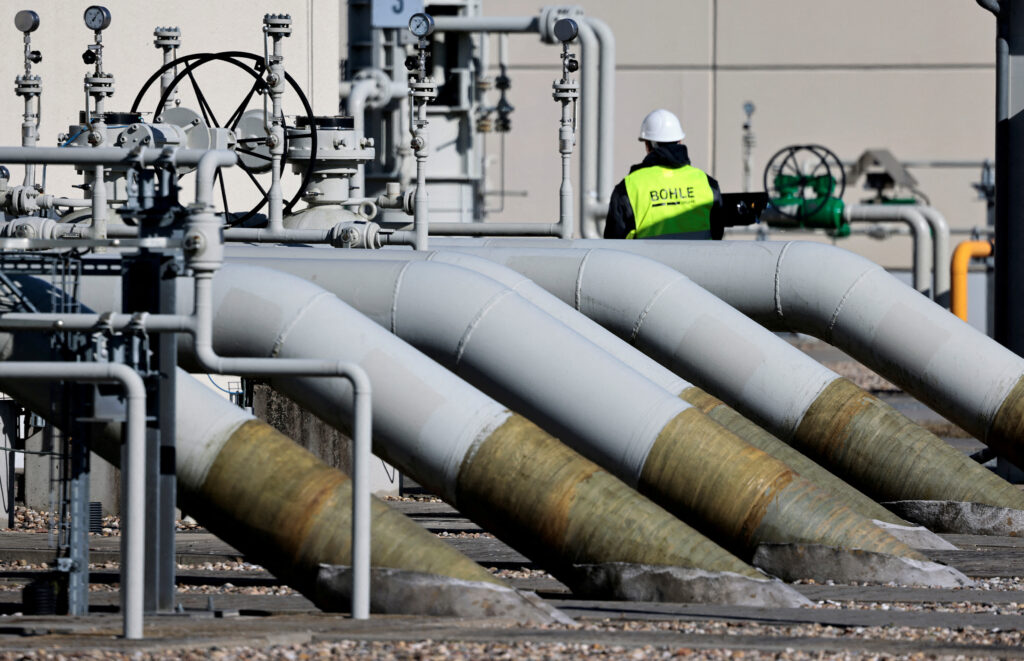European gas prices surged, share prices slid and the euro sank on Monday after Russia stopped pumping gas to Europe via a major supply route, sending a new tsunami through the European Union economy that has yet to recover from the COVID-19 pandemic.
EU governments are racing through packages worth billions of dollars to prevent power companies being crushed by a liquidity crunch and to protect households from soaring bills, after Russia’s state-controlled Gazprom GAZP.MM said it would stop pumping gas via the Nord Stream 1 pipeline due to a fault.
Europe has accused Russia of weaponising energy supplies in retaliation for Western sanctions imposed on Moscow over its invasion of Ukraine. Russia says the West has launched an economic war and sanctions have hampered pipeline operations.
A host of European power distributors have already collapsed and some major generators could be at risk, hit by caps that limit prices rises they can pass on to consumers or caught out by hedging bets with gas prices now 400% more than a year ago.
“This has had the ingredients for a kind of a Lehman Brothers of energy industry,” Finnish Economic Affairs Minister Mika Lintila said on Sunday, referring to the U.S. bank that collapsed in 2008 and heralded the global financial crash.
Finland aims to offer 10 billion euros and Sweden 250 billion Swedish crowns ($23 billion) in liquidity guarantees to their power companies. Germany, more reliant than most EU states on Russian gas, has offered a multibillion-euro bailout to power utility Uniper
“The government’s programme is a last-resort financing option for companies that would otherwise be threatened with insolvency,” Finland’s Prime Minister Sanna Marin said.
The benchmark gas price TRNLTTFMc1 surged 35% on the day on Monday to 284 euros per megawatt hour (MWh), after Russia said on Friday a leak in Nord Stream 1 equipment meant it would stay shut beyond last week’s three-day maintenance halt.
European financial markets were reeling from the news. The euro sank to a 20-year low and European shares tumbled.
Nord Stream 1, which runs under the Baltic Sea to Germany, historically supplied about a third of the gas Russia exported to Europe, although it was already running at just 20% of capacity before last week’s maintenance outage.
EU politicians say Russia has been creating pretexts to halt supplies. The Kremlin said on Monday anger in the EU over rising energy prices was the result of “harmful” decisions by EU governments.
EMERGENCY PLANS
Russia also sends gas to Europe via pipeline across Ukraine, another major route. But those supplies have also been reduced during the crisis, leaving the EU racing to find alternative supplies to refill gas storage facilities for winter.
Several EU states have triggered emergency plans that could lead to energy rationing and fuelling recession fears, with inflation soaring and interest rates on the rise.
Some energy-intensive industries in Europe, such as fertiliser makers and aluminium producers, have already scaled back production. Other industries, already grappling with chip shortages and logistics logjams, face rocketing fuel bills.
“Supply is hard to come by, and it becomes harder and harder to replace every bit of gas that doesn’t come from Russia,” said Jacob Mandel, senior associate for commodities at Aurora Energy Research.
EU countries’ energy ministers are due to meet on Sept. 9 to discuss options to rein in soaring energy prices including gas price caps and emergency credit lines for energy market participants, a document seen by Reuters showed.
German Chancellor Olaf Scholz said on Sunday that Germany, the EU’s economic powerhouse, had been preparing for a total halt in gas deliveries.
Germany is at phase two of a three-stage emergency gas plan. Phase three would see some industry rationing.
In the race for alternative supplies, Germany is installing temporary liquefied natural gas (LNG) terminals as a stopgap while it builds permanent facilities, so it can ship in gas from further afield.
“There’s plenty of scope to replace that (Russian) gas with LNG imports for now, but when the weather turns cold and demand starts to pick up in the winter in Europe and Asia, there’s only so much LNG out there that Europe can import,” Mandel said.
The global market for LNG was already tight as the world economy sucked up supplies in the recovery from the pandemic. The Ukraine crisis has added further demand.
Norway, a major European producer, has been pumping more gas into European markets but cannot fill the gap left by Russia.
Klaus Mueller, president of Germany’s Federal Network Agency energy regulator, said in August that even if Germany’s gas stores were 100% full, they would be empty in 2-1/2 months if Russian gas flows were halted completely.
Germany’s storage facilities are now about 85% full, while facilities across Europe hit an 80% target last week.


